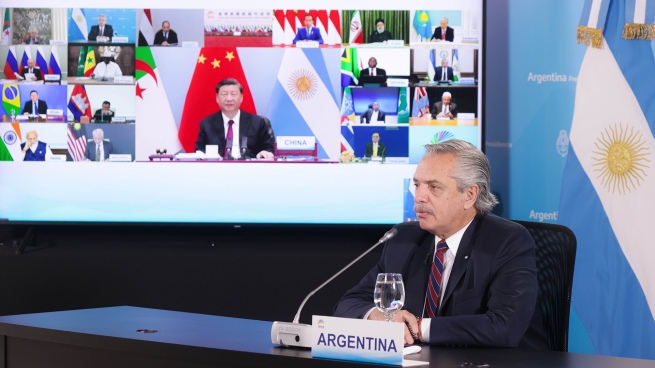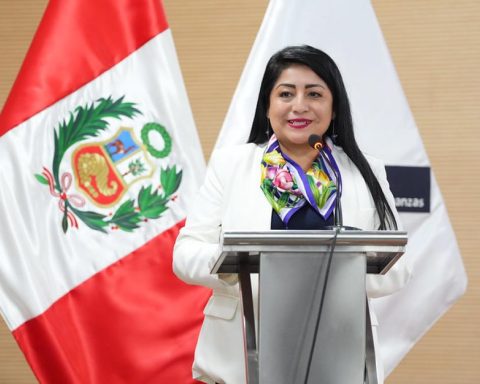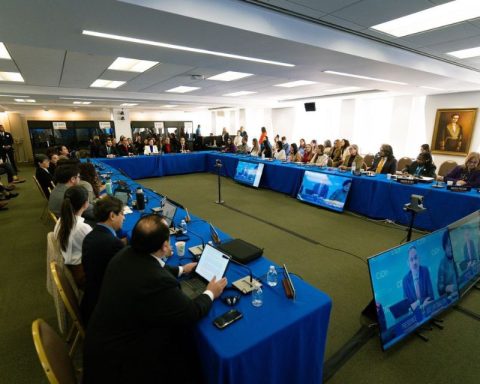“Observe calmly; secure our position; face the facts calmly; hide our abilities and gain time; keep a low profile and never claim leadership”Deng Xiaoping
The statement from the Chinese Foreign Ministry welcoming the entry of our country into the agreement between the most relevant medium powers validates the incorporation of Argentina into the first league of world politics, but it is to celebrate in silence. In a world at war dangers lie in wait. The defense of Argentine neutrality passes through very narrow defiles. Adding an A to the BRICS is a huge international achievement, but what results from this accession will depend on the vision, intelligence and cunning of our leaders.
Through a diplomatic communication, the government of the People’s Republic communicated last Wednesday in a concise sentence that “China welcomes Argentina to the great BRICS family” and is “willing to strengthen communication and coordination between the two countries in international and regional affairs. Previously, this Tuesday during a meeting with the Argentine Foreign Minister, Santiago Cafiero, on the sidelines of the 77th session of the United Nations General Assembly in New York, the Chinese Foreign Minister, Wang Yi, expressed his endorsement of our incorporation into the block.
At the meeting, the head of Beijing diplomacy said that “China appreciates Argentina’s adherence to the principle of one China and supports Argentina in safeguarding national sovereignty and territorial integrity.”
At the meeting, Cafiero said that since the establishment of diplomatic relations 50 years ago, the two countries have always respected, united and cooperated. “Thanks to China for its strong support to Argentina. Argentina firmly adheres to the one-China policy, welcomes Chinese investment, and is willing to promote the joint construction of the Belt and Road, expand bilateral cooperation in various fields such as economy, trade, minerals, natural gas, shale and natural gas, and open the next 50 years of more fruitful relations between the two countries”, said the foreign minister.
The BRICS nations as a whole represent 22% of the planet’s land surface, 42% of the world’s population, 24% of the global Gross Domestic Product (GDP) and contribute 16% of exports and 15% of world imports of goods and services.
The alliance emerged in 2008, when Brazil, Russia, India and China began to develop common approaches to international economics. In 2010, South Africa joined and the BRICs became the BRICS.
BRICS is not a trade association or an economic integration organization, but rather a block of medium-sized nations coordinated to develop equitable and mutually recognized relations among themselves and with the other members of the international community. According to its own documents, the BRICS mechanism aims to promote peace, security, development and cooperation.
Currently the association is chaired by China; the next president pro tempore will be South Africa. Argentina will formally join BRICS at the next summit meeting, probably together with the Islamic Republic of Iran.
The main advantages of belonging to the bloc are related to trade and market access, foreign direct investment and, above all, greater bargaining power and a common voice in international affairs. Currently, sectoral cooperation covers more than 30 areas.
In 2014, during the 11th summit held in Brazil, institutions of paramount strategic importance were created, such as the New Development Bank (NDB) and the Contingent Reserves Agreement (CRA, idem), which have effects and far-reaching implications for the global world in general and the BRICS economies in particular. In recent years, the NDB has approved some 80 infrastructure and sustainable development projects worth 30 billion dollars, which also include loans granted under the NDB Mechanism for Emergency Assistance among member countries.
Although there is widespread enthusiasm for the bloc’s expansion, the initiative faces practical limitations. The first is the ideological disconnect between the current BRICS members. Aside from their weight in respective regions and having large landmasses with sizable populations, there isn’t much else in common. Their interests are diverse and sometimes collide.
The second practical limitation to expansion is related to finances. South Africa, Russia and Brazil are dealing with their own internal and external monetary problems, so their financial capacity is limited. In other words, the institutions that support the alliance must be financed mainly by China, which can lead to a national bias in the bloc’s credit policy.
Three factors have recently renewed the momentum of this initiative. In the first place, the lack of confidence in the conduct of the Western powers in multilateral organizations, particularly in the financial and commercial ones. American diplomats constantly talk about the need for all international actors to “adhere to rules”, but avoid defining them when asked about them. At the same time in the last twenty years they have abrogated all Cold War-era treaties that limited the risk of nuclear war. They have also emptied the United Nations agencies of content with unilateral decisions and without consultation.
Second, the behavior of the North during COVID-19 – especially through “vaccine apartheid” – has pushed developing countries to seek more reliable and fair alliances.
Third, the West’s narrow Cold War mentality around the Russia-Ukraine conflict has alienated developing nations who don’t want to choose one side or the other.
In this context, the shift towards an enlarged BRICS is inevitable in the long run. However, it will happen gradually. Enlargement is not so much about increasing the power base as it is about creating alliances and alternative options, away from the current dependence on the dollar and Western hegemony.
Precisely this greater freedom to choose international partners and interlocutors that Argentina will acquire by joining the BRICS terrifies the United States. With nothing to offer the continent but (necessary) fine words at international financial institutions or (unnecessary) threats, Washington is in a poor position to compete with Beijing. The more aggressive he has become.
Whether it is the North American legislators who, together with an FBI official a few months ago, came to Argentina to visit Atucha, or the Argentine-American Chamber of Commerce (AmCham) that last week spoke out against the expansion of the Supreme Court of Justice or the Chief of the Southern Command of the US Armed Forces, General Laura Richardson, who two weeks ago met in Ecuador with the defense ministers of ten countries on the continent to warn them about the danger posed by Chinese investments, lack of investment productive to offer, the United States has only the reason of force.
By the way, in the delicate financial situation in which it finds itself, our country cannot afford to face the still leading power in the world. It is good that Argentina adds an A to the BRICS, it is good that we take advantage of its credit possibilities. In this world, which is increasingly unstable, confrontational and chaotic, everything seems to indicate that the only way out of underdevelopment and dependency is to privilege those links that give us greater room for maneuver in decision-making and exclude us from any blackmail policy for the realization of our external projection and our internal policy.
However, one thing is to lurch and another is to carry out a pragmatic international policy. Not every international agreement contributes to the development and sovereignty of the country; you cannot erase with your elbow what was affirmed yesterday to the shouts. Since the beginning of this year our government has made several erratic and unnecessary international decisions that will be hard to walk away from. The order of priorities of the initiatives of our Foreign Ministry must be to expand Argentina’s room for maneuver in the world, establish a solid system of alliances with reliable partners, maintain good relations with the largest possible number of countries (which also implies not assuming as their own confrontations with others), do good business, attract productive investment and spread a positive image of Argentina in the world.
These priorities require a strong vision for the future of our country, leadership skills, tactical ability, and cunning. Only by fulfilling these conditions can we take advantage of having added an A to the BRICS.


















